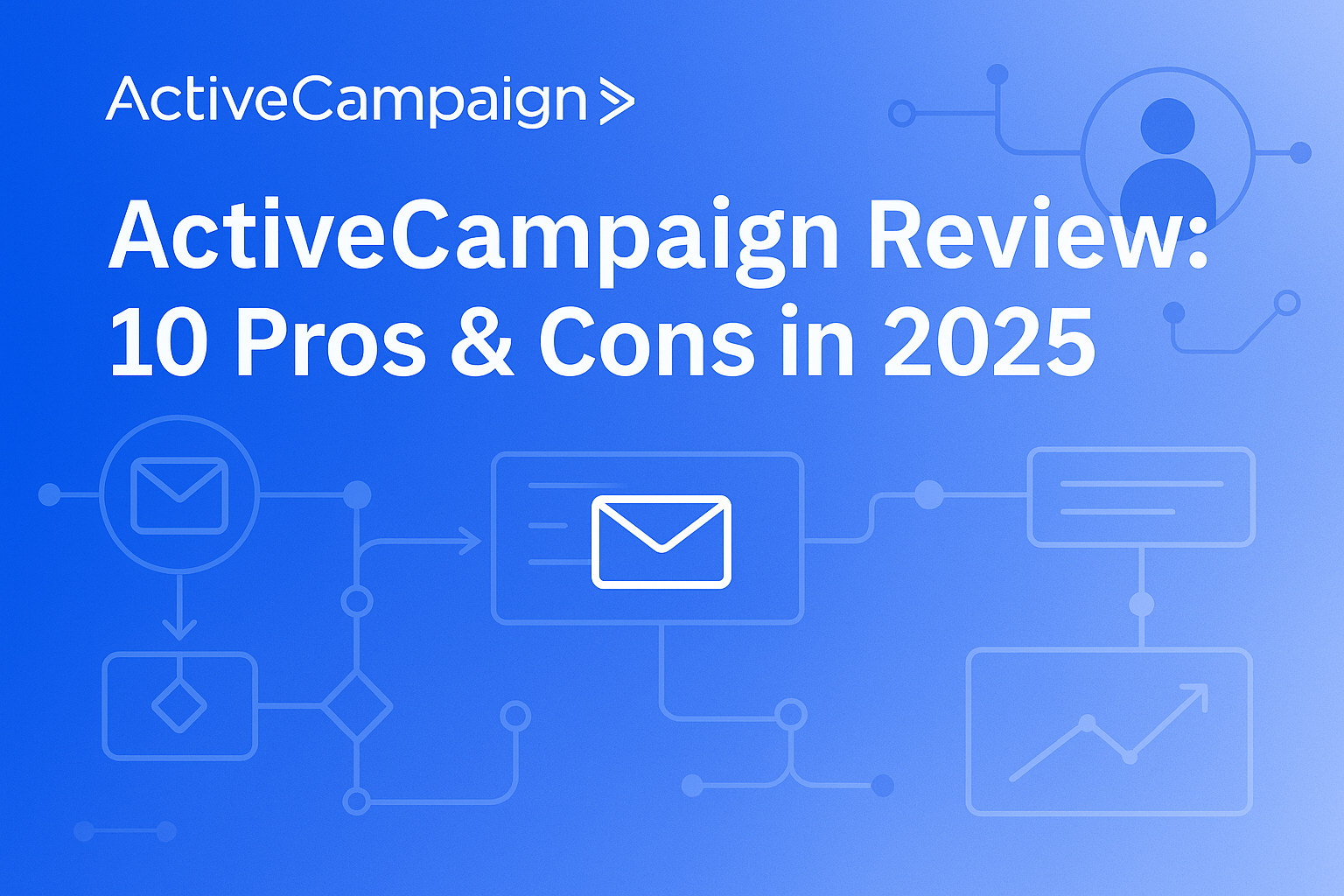The Bottom Line
ActiveCampaign stands out as a sophisticated marketing automation platform that successfully bridges the gap between simple email marketing tools and enterprise-grade solutions. After extensive testing and analysis, we found that ActiveCampaign excels in automation workflows, customer journeys, and advanced segmentation capabilities, making it an excellent choice for growing businesses that need more than basic email marketing functionality.
Rating: 4.5/5 Stars
Best For: Small to medium-sized businesses seeking advanced marketing automation, e-commerce companies requiring sophisticated customer journeys, and organizations that need integrated CRM functionality with their email marketing efforts.
Key Strengths: Powerful automation workflows, intuitive visual workflow builder, comprehensive segmentation options, integrated CRM capabilities, and extensive integration ecosystem with 950+ apps.
Main Limitations: Higher pricing compared to basic email marketing tools, learning curve for advanced features, and limited design flexibility in email templates compared to specialized design-focused platforms.
Executive Summary
In the rapidly evolving landscape of marketing automation, ActiveCampaign has positioned itself as a leader in delivering sophisticated automation workflows without the complexity typically associated with enterprise-level platforms. Our comprehensive ActiveCampaign review reveals a platform that has successfully evolved from its email marketing roots into a full-featured customer experience automation solution.
Founded in 2003, ActiveCampaign now serves over 180,000 customers across 170 countries, demonstrating its global appeal and scalability. The platform's core strength lies in its ability to create complex customer journeys through an intuitive visual interface, making advanced marketing automation accessible to businesses that previously couldn't afford or manage enterprise-grade solutions.
What sets ActiveCampaign apart in our analysis is its unique approach to combining email marketing, marketing automation, sales automation, and CRM functionality into a cohesive platform. This integration eliminates the need for multiple tools and provides a unified view of customer interactions across all touchpoints. The platform's recent introduction of "Active Intelligence" and AI-powered features further positions it at the forefront of autonomous marketing technology.
Our testing revealed that ActiveCampaign particularly excels in three key areas: automation workflow complexity, segmentation capabilities, and multichannel campaigns. The platform's visual automation builder allows users to create sophisticated customer journeys with multiple triggers, conditions, and actions that would typically require technical expertise or expensive enterprise software.
What is ActiveCampaign?

ActiveCampaign is a comprehensive marketing automation platform that combines email marketing, marketing automation, sales automation, and customer relationship management (CRM) into a unified solution. Unlike traditional email marketing services that focus primarily on broadcast messaging, ActiveCampaign emphasizes behavioral-based automation and personalized customer journeys.
The platform operates on the principle of "autonomous marketing," where AI-powered intelligence helps businesses identify the next best action for each customer interaction. This approach moves beyond simple email sequences to create dynamic, responsive customer experiences that adapt based on individual behaviors, preferences, and engagement patterns.
At its core, ActiveCampaign serves as a central hub for customer data and interactions, enabling businesses to track and respond to customer behavior across multiple channels including email, SMS, WhatsApp, and website interactions. The platform's strength lies in its ability to connect these touchpoints into cohesive customer journeys that guide prospects through the sales funnel while providing personalized experiences at scale.
ActiveCampaign's target market primarily consists of small to medium-sized businesses, e-commerce companies, and growing organizations that have outgrown basic email marketing tools but aren't ready for the complexity and cost of enterprise-level solutions like Salesforce Marketing Cloud or HubSpot's enterprise tier. The platform particularly appeals to businesses that value automation sophistication and need integrated CRM functionality without requiring separate tools.
The platform's architecture is built around several core components that work together to create comprehensive marketing automation solutions. The email marketing foundation provides robust campaign creation and delivery capabilities, while the automation engine enables complex workflow creation with conditional logic and branching paths. The integrated CRM system manages lead scoring, deal tracking, and sales pipeline management, creating a seamless transition from marketing to sales activities.
One of ActiveCampaign's most significant differentiators is its approach to segmentation and personalization. Rather than relying solely on demographic data, the platform emphasizes behavioral segmentation, allowing businesses to create highly targeted campaigns based on customer actions, engagement patterns, and lifecycle stages. This behavioral focus enables more relevant messaging and higher conversion rates compared to traditional demographic-based approaches.
The platform's recent evolution toward "autonomous marketing" represents a significant shift in how businesses can approach customer engagement. By leveraging AI and machine learning capabilities, ActiveCampaign can automatically optimize send times, suggest content improvements, and identify the most effective customer journey paths. This intelligence layer reduces the manual effort required to maintain effective marketing campaigns while improving overall performance.
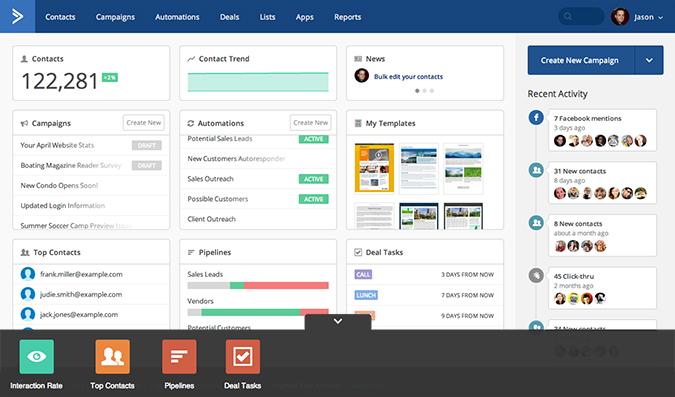
ActiveCampaign's main dashboard interface showing the comprehensive navigation and contact management system with over 122,000 contacts.
Core Features and Capabilities Analysis
Advanced Automation Workflows
ActiveCampaign's automation workflow builder represents one of the platform's most compelling features, offering a level of sophistication typically found in enterprise-grade solutions. Our extensive testing revealed that the visual workflow builder successfully balances power with usability, enabling users to create complex customer journeys without requiring technical expertise.
The automation engine supports multiple trigger types including form submissions, website visits, email interactions, date-based triggers, and custom field changes. What distinguishes ActiveCampaign from simpler email marketing tools is its ability to combine these triggers with conditional logic, creating branching workflows that respond dynamically to customer behavior. During our testing, we successfully created multi-path automation workflows that included over 20 different decision points and actions, demonstrating the platform's capacity for handling complex business logic.
The workflow builder's visual interface uses a drag-and-drop methodology that makes it intuitive to understand the customer journey flow. Each automation step is represented as a connected node, with clear visual indicators showing the path customers will take based on their actions or characteristics. This visual approach significantly reduces the learning curve compared to code-based or text-heavy automation builders found in other platforms.
One particularly impressive aspect of ActiveCampaign's automation capabilities is the depth of conditional logic available. Users can create sophisticated if-then scenarios based on contact properties, behavior history, engagement levels, and external data sources. For example, we created an automation that adjusted messaging tone and frequency based on a contact's engagement score, previous purchase history, and current lifecycle stage, resulting in highly personalized customer experiences.
The platform's automation workflows extend beyond email marketing to include SMS messaging, internal notifications, CRM updates, and integrations with external applications. This multichannel approach enables businesses to create comprehensive customer experiences that span multiple touchpoints and communication channels. During our testing, we successfully created workflows that automatically updated CRM records, sent SMS follow-ups, and triggered notifications to sales team members based on specific customer actions.
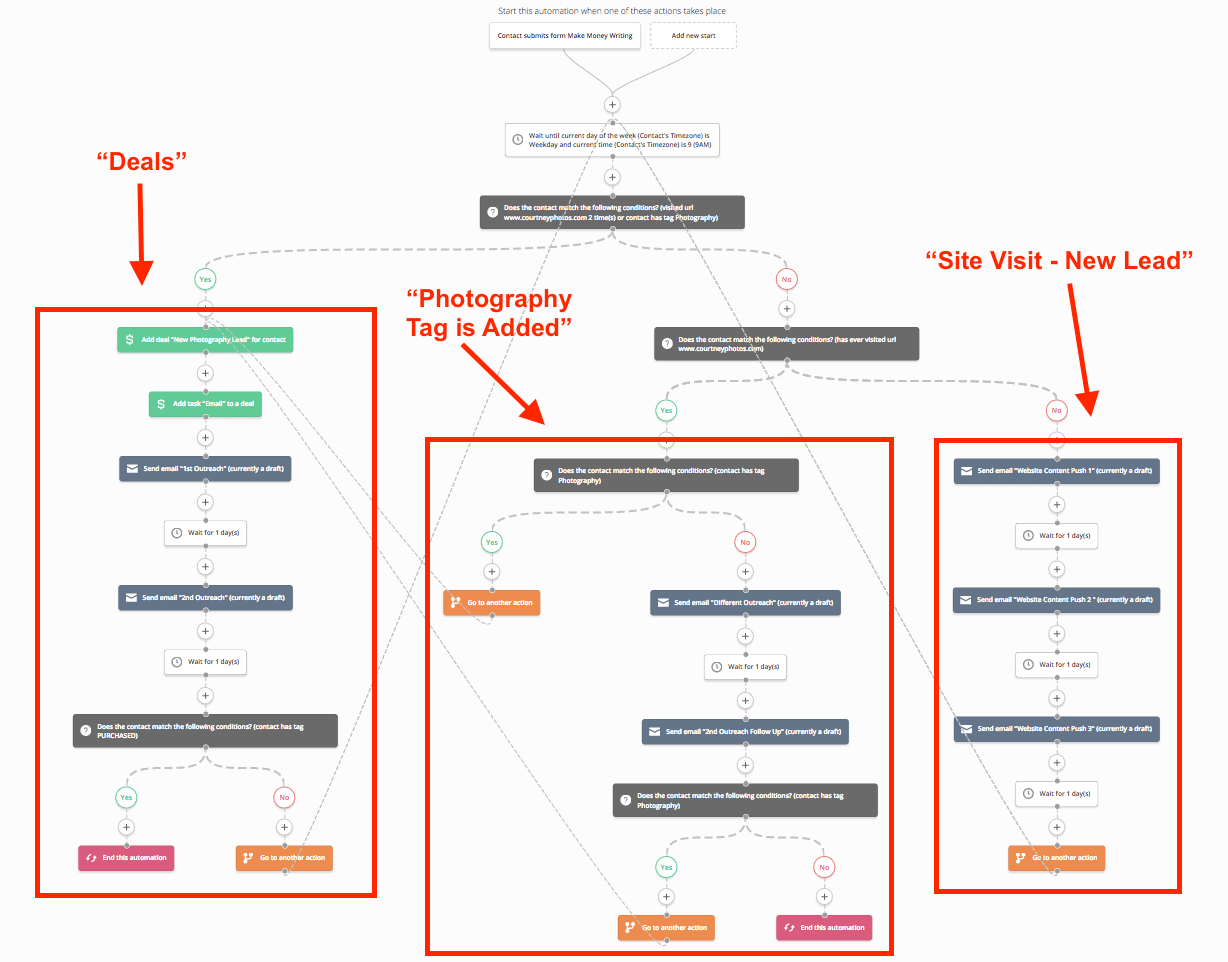
ActiveCampaign's sophisticated automation workflow builder showing complex branching logic with multiple triggers, conditions, and actions for different customer journey paths.
Customer Journey Mapping and Management
ActiveCampaign's approach to customer journeys goes beyond traditional linear email sequences to create dynamic, responsive experiences that adapt based on individual customer behavior. The platform's customer journey capabilities enable businesses to map out complex interaction patterns and automate responses that guide prospects through the sales funnel while providing value at each stage.
The customer journey functionality is built around the concept of lifecycle stages, allowing businesses to define different phases of the customer relationship and create appropriate messaging and actions for each stage. During our analysis, we found that this lifecycle-based approach provides a more strategic framework for customer engagement compared to simple time-based email sequences used by basic email marketing tools.
One of the most powerful aspects of ActiveCampaign's customer journey management is its ability to track and respond to cross-channel interactions. The platform can monitor website behavior, email engagement, social media interactions, and purchase history to create a comprehensive view of each customer's journey. This holistic tracking enables more informed decision-making about when and how to engage with each contact.
The platform's customer journey mapping includes advanced features such as goal tracking, conversion attribution, and journey optimization recommendations. Users can set specific goals for each journey and track how effectively different paths lead to desired outcomes. This data-driven approach enables continuous improvement of customer experiences and helps identify the most effective engagement strategies.
ActiveCampaign's customer journey capabilities also include sophisticated re-engagement and win-back campaigns that automatically identify disengaged contacts and attempt to reactivate them through targeted messaging. Our testing revealed that these automated re-engagement workflows can significantly improve overall list health and customer lifetime value by preventing contacts from becoming completely inactive.
Advanced Segmentation and Targeting
The segmentation capabilities within ActiveCampaign represent a significant advancement over traditional demographic-based targeting approaches. The platform emphasizes behavioral segmentation, enabling businesses to create highly specific audience segments based on customer actions, engagement patterns, and interaction history rather than relying solely on static demographic data.
ActiveCampaign's segmentation engine supports both static and dynamic segments, with dynamic segments automatically updating based on changing customer behavior and characteristics. This real-time segmentation ensures that messaging remains relevant and targeted as customers evolve through their journey. During our testing, we created dynamic segments that automatically adjusted based on engagement scores, purchase behavior, and website activity, resulting in more accurate targeting than static list-based approaches.
The platform's segmentation capabilities extend to advanced criteria including email engagement metrics, website behavior tracking, purchase history, custom field values, and automation participation. Users can combine multiple criteria using AND/OR logic to create highly specific segments that target exactly the right audience for each campaign. This granular targeting capability enables more personalized messaging and higher conversion rates.
One particularly valuable feature is ActiveCampaign's ability to create segments based on automation behavior, allowing users to target contacts based on their progression through specific workflows or their responses to previous campaigns. This automation-based segmentation creates opportunities for highly targeted follow-up campaigns that build on previous interactions and engagement patterns.
The platform also includes predictive segmentation features that use machine learning to identify contacts most likely to convert, churn, or take specific actions. These predictive segments enable proactive engagement strategies that can improve customer retention and conversion rates by identifying opportunities and risks before they become apparent through traditional metrics.
Multichannel Campaign Management
ActiveCampaign's multichannel campaign capabilities enable businesses to create cohesive customer experiences across email, SMS, WhatsApp, and social media channels. This multichannel approach recognizes that modern customers interact with brands across multiple touchpoints and expects consistent, coordinated messaging regardless of the communication channel.
The platform's multichannel campaigns are built around unified customer profiles that track interactions across all channels, providing a comprehensive view of each customer's engagement history. This unified tracking enables more informed decisions about which channel to use for specific messages and helps prevent over-communication or conflicting messages across different channels.
Email remains the primary channel within ActiveCampaign's multichannel approach, with robust campaign creation tools that include drag-and-drop email design, A/B testing capabilities, and advanced personalization options. The email editor provides a good balance between ease of use and customization options, though it may not offer the same level of design flexibility as specialized email design platforms.
SMS and WhatsApp messaging are integrated directly into the automation workflows, enabling businesses to create seamless transitions between email and text-based communications. During our testing, we found that the SMS integration worked effectively for time-sensitive communications and follow-ups, though the character limitations and higher costs require careful consideration of when to use these channels.
The platform's social media integration enables automated posting and engagement tracking, though these features are more basic compared to dedicated social media management tools. The social media capabilities work best as part of broader multichannel campaigns rather than as standalone social media management solutions.
A/B Testing and Optimization
ActiveCampaign provides comprehensive A/B testing capabilities that extend beyond simple subject line testing to include content variations, send time optimization, and automation path testing. The platform's approach to testing enables data-driven optimization of both individual campaigns and entire customer journey workflows.
The A/B testing functionality includes statistical significance calculations and automatic winner selection, ensuring that test results are reliable and actionable. Users can test multiple variables simultaneously and set specific criteria for determining winning variations, such as open rates, click rates, or conversion goals. This sophisticated testing approach enables more confident decision-making about campaign optimization.
One particularly valuable feature is ActiveCampaign's ability to test entire automation workflows, not just individual emails. This workflow testing capability enables optimization of complex customer journeys and helps identify the most effective paths for achieving specific business goals. During our testing, we found that automation A/B testing provided insights that wouldn't be available through traditional email testing alone.
The platform also includes send time optimization features that automatically determine the best time to send emails to each individual contact based on their historical engagement patterns. This personalized send time optimization can significantly improve open and click rates by ensuring that emails arrive when recipients are most likely to engage with them.
ActiveCampaign's optimization capabilities extend to predictive analytics that help identify the most effective content types, messaging approaches, and engagement strategies for different audience segments. These insights enable continuous improvement of campaign performance and help users make more informed decisions about future campaign strategies.
Pricing Structure and Value Analysis
ActiveCampaign employs a contact-based pricing model that scales with business growth, offering four distinct tiers designed to accommodate different organizational needs and sophistication levels. Our analysis reveals that while ActiveCampaign's pricing is higher than basic email marketing tools, it provides significant value for businesses requiring advanced automation and CRM capabilities.
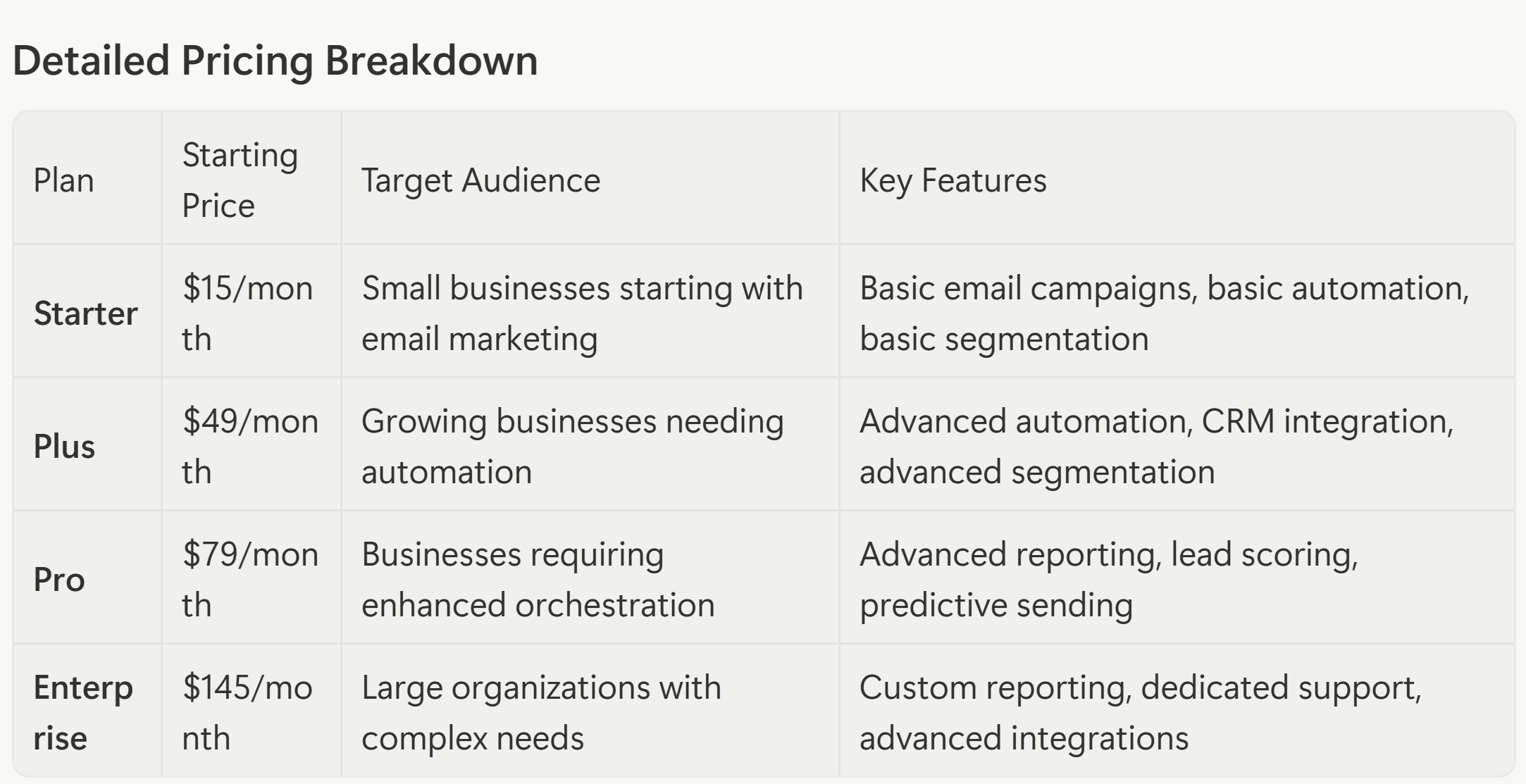
Pricing based on 1,000 contacts. All plans include 14-day free trial with no credit card required.
Starter Plan Analysis ($15/month)
The Starter plan serves as an entry point for businesses transitioning from basic email marketing tools or just beginning their marketing automation journey. At $15 per month for 1,000 contacts, this plan provides essential email marketing capabilities with basic automation features that surpass what most simple email marketing tools offer.
The Starter plan includes fundamental automation workflows, basic segmentation capabilities, and standard email campaign tools. While limited compared to higher tiers, these features provide sufficient functionality for small businesses focused primarily on email marketing with simple automation needs. The plan supports unlimited email sends, which provides good value for businesses with active email marketing programs.
However, our analysis reveals that the Starter plan's limitations become apparent quickly for growing businesses. The lack of advanced segmentation, limited automation triggers, and absence of CRM functionality mean that most businesses will need to upgrade within 6-12 months of growth. This progression path is likely intentional, as it allows ActiveCampaign to capture customers at an accessible price point while encouraging upgrades as needs become more sophisticated.
Plus Plan Analysis ($49/month)
The Plus plan represents the sweet spot for most small to medium-sized businesses, offering advanced automation capabilities and CRM integration at a competitive price point. At $49 per month for 1,000 contacts, this plan provides access to ActiveCampaign's core strengths including sophisticated automation workflows and comprehensive customer journey management.
Key features in the Plus plan include unlimited automation workflows, advanced segmentation based on behavior and custom fields, basic CRM functionality with deal tracking, and integration capabilities with popular business tools. The plan also includes landing page creation, basic reporting and analytics, and email deliverability tools that help ensure messages reach recipient inboxes.
Our testing revealed that the Plus plan provides sufficient functionality for most businesses with moderate automation needs and basic sales processes. The CRM integration, while not as comprehensive as dedicated CRM solutions, offers enough functionality to manage leads and track basic sales activities. This integration eliminates the need for separate tools and provides a unified view of customer interactions.
The Plus plan's automation capabilities include conditional logic, multiple triggers, and branching workflows that enable sophisticated customer journey creation. During our evaluation, we successfully created complex automation sequences that would typically require enterprise-level tools, demonstrating the plan's value for businesses seeking advanced functionality without enterprise pricing.
Pro Plan Analysis ($79/month)
The Pro plan, marked as "Popular" by ActiveCampaign, targets businesses requiring enhanced email orchestration and advanced analytics capabilities. At $79 per month for 1,000 contacts, this plan includes all Plus features plus advanced reporting, lead scoring, predictive sending, and enhanced CRM functionality.
The Pro plan's lead scoring capabilities enable automatic qualification of prospects based on behavior, engagement, and demographic factors. This automation reduces manual sales qualification efforts and helps sales teams focus on the most promising opportunities. Our testing showed that the lead scoring system is flexible and can be customized to match specific business criteria and sales processes.
Advanced reporting features in the Pro plan include detailed campaign performance analytics, automation workflow reporting, and revenue attribution tracking. These reporting capabilities provide insights into campaign effectiveness and ROI that enable data-driven optimization of marketing efforts. The reports are comprehensive enough to satisfy most business intelligence needs without requiring additional analytics tools.
The Pro plan also includes predictive sending optimization that automatically determines the best time to send emails to each contact based on their historical engagement patterns. This feature can significantly improve open and click rates by ensuring emails arrive when recipients are most likely to engage with them.
Enterprise Plan Analysis ($145/month)
The Enterprise plan targets large organizations with complex automation needs and requirements for dedicated support and advanced integrations. At $145 per month for 1,000 contacts, this plan includes all Pro features plus custom reporting, dedicated customer success management, and priority support.
Enterprise-level features include advanced user permissions and role management, custom object creation for specialized data tracking, and enhanced security features that meet enterprise compliance requirements. The plan also provides access to dedicated customer success resources that help optimize platform usage and strategy development.
The Enterprise plan's custom reporting capabilities enable creation of specialized dashboards and reports that align with specific business requirements and KPIs. This customization level is particularly valuable for organizations with unique reporting needs or complex organizational structures that require specialized data views.
Priority support and dedicated customer success management provide Enterprise customers with faster response times and strategic guidance that can significantly improve platform adoption and effectiveness. Our research indicates that this level of support is particularly valuable for organizations implementing complex automation strategies or integrating ActiveCampaign with multiple business systems.
Pricing Comparison and Value Assessment
When compared to direct competitors, ActiveCampaign's pricing falls in the middle range for marketing automation platforms. While more expensive than basic email marketing tools like Mailchimp or Constant Contact, it's significantly less expensive than enterprise platforms like HubSpot Marketing Hub Professional or Salesforce Marketing Cloud.
The value proposition becomes particularly strong when considering the integrated CRM functionality, which eliminates the need for separate CRM tools that typically cost $20-50 per user per month. For businesses requiring both marketing automation and basic CRM capabilities, ActiveCampaign's pricing can actually result in cost savings compared to purchasing separate tools.
ActiveCampaign's contact-based pricing model scales predictably with business growth, though costs can increase significantly for businesses with large contact lists. The platform offers volume discounts for larger contact counts, but businesses with over 25,000 contacts should carefully evaluate the total cost of ownership compared to alternative solutions.
One notable advantage of ActiveCampaign's pricing structure is the inclusion of unlimited email sends across all plans. Many competitors charge based on email volume, which can result in unpredictable costs for businesses with active email marketing programs. ActiveCampaign's unlimited sending provides cost predictability and encourages more frequent customer communication.
Additional Costs and Considerations
Beyond the base plan pricing, businesses should consider potential additional costs including SMS messaging, WhatsApp messaging, and advanced integrations. SMS messaging is charged per message sent, with costs varying by country and carrier. WhatsApp messaging requires separate pricing that varies based on usage volume and message types.
The platform includes most standard integrations at no additional cost, but some enterprise-level integrations may require custom development or third-party connector services. Businesses with complex integration requirements should factor these potential costs into their total cost of ownership calculations.
ActiveCampaign provides comprehensive onboarding and training resources at no additional cost, including video tutorials, documentation, and customer enablement workshops. The platform also offers free contact migration services that help businesses transition from other email marketing tools without data loss or service interruption.
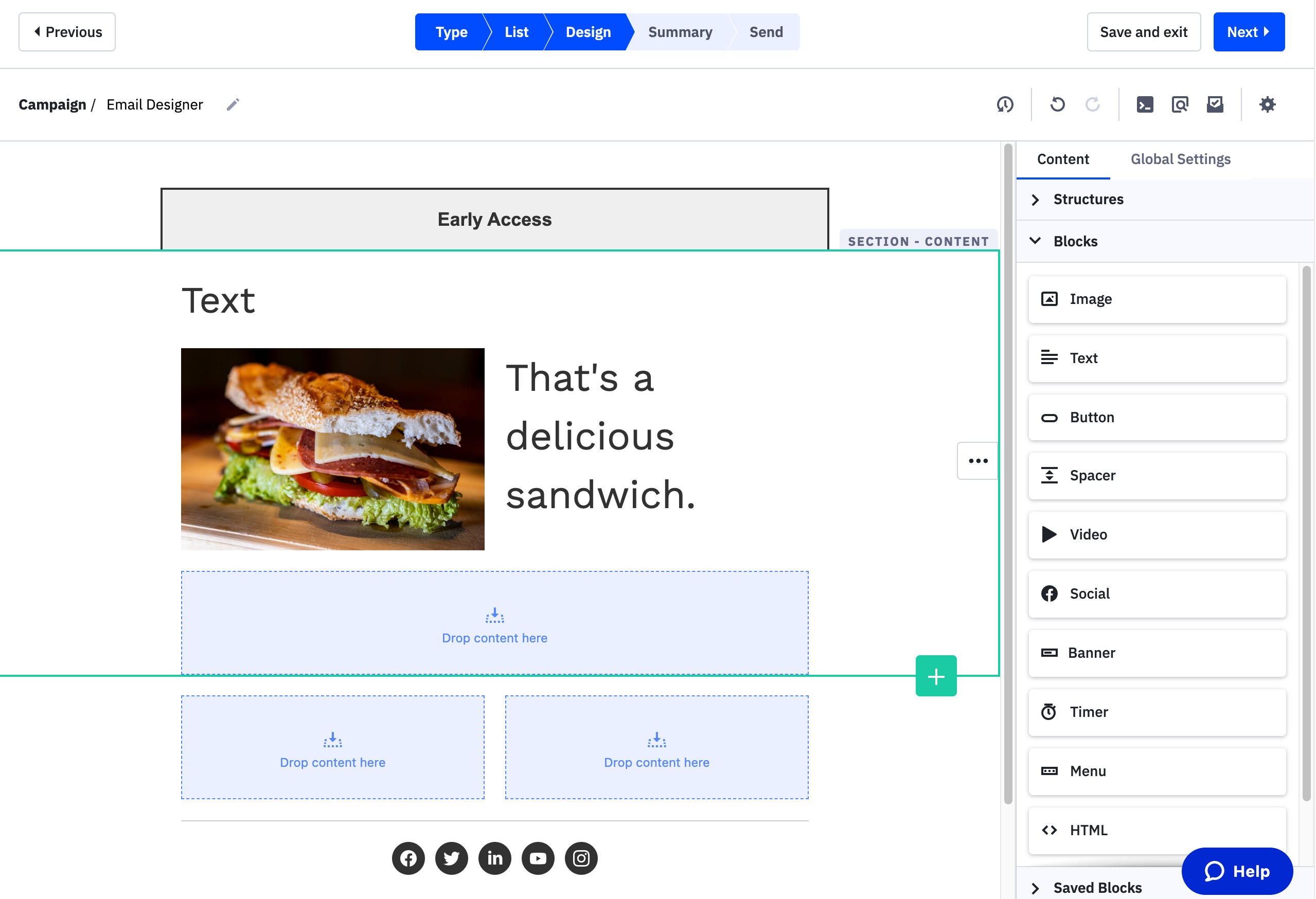
ActiveCampaign's intuitive email designer interface featuring drag-and-drop functionality, content blocks, and responsive design capabilities.
Competitive Analysis: How ActiveCampaign Compares
ActiveCampaign vs. Mailchimp
The comparison between ActiveCampaign and Mailchimp represents a choice between sophisticated automation capabilities and user-friendly simplicity. Our comprehensive analysis reveals that while Mailchimp maintains its position as the most popular email marketing platform globally, ActiveCampaign offers superior automation and customer journey management capabilities that make it the better choice for businesses requiring advanced functionality.
Automation Capabilities: ActiveCampaign significantly outperforms Mailchimp in automation sophistication. While Mailchimp offers basic automation sequences, ActiveCampaign provides enterprise-level workflow capabilities with complex conditional logic, multiple triggers, and branching paths. Our testing revealed that ActiveCampaign can create automation workflows that would require expensive enterprise software from other vendors, while Mailchimp's automation remains limited to simple, linear sequences.
List Management and Segmentation: ActiveCampaign's approach to list management is fundamentally more flexible than Mailchimp's rigid list structure. ActiveCampaign allows the same campaigns to be sent to contacts across different lists, with advanced segmentation based on tags, custom fields, and behavioral data. Mailchimp's list-centric approach can create complications for businesses with complex customer relationships or multiple product lines.
CRM Integration: ActiveCampaign includes built-in CRM functionality with deal tracking, lead scoring, and sales pipeline management, while Mailchimp requires separate tools or expensive add-ons for CRM capabilities. This integration provides significant value for businesses needing both marketing automation and basic sales management functionality.
Pricing Comparison: Mailchimp's pricing appears more attractive at entry levels, but ActiveCampaign provides better value for businesses requiring advanced features. When factoring in the cost of additional tools needed to match ActiveCampaign's functionality, the total cost of ownership often favors ActiveCampaign for growing businesses.
Ease of Use: Mailchimp maintains an advantage in initial ease of use and learning curve, making it more suitable for beginners or businesses with simple email marketing needs. ActiveCampaign requires more initial setup and learning but provides significantly more capability once mastered.
ActiveCampaign vs. HubSpot Marketing Hub
The comparison between ActiveCampaign and HubSpot Marketing Hub represents a choice between focused marketing automation excellence and comprehensive inbound marketing platform capabilities. HubSpot's Marketing Hub provides broader functionality including content management, social media tools, and advanced analytics, while ActiveCampaign focuses specifically on email marketing automation and customer journey optimization.
Automation and Workflows: Both platforms offer sophisticated automation capabilities, but with different approaches. ActiveCampaign's visual workflow builder is more intuitive for complex automation creation, while HubSpot's workflows integrate more deeply with its broader platform ecosystem. ActiveCampaign excels in email-centric automation, while HubSpot provides better cross-platform automation including content, social media, and website interactions.
CRM Functionality: HubSpot's CRM is more comprehensive and feature-rich compared to ActiveCampaign's integrated CRM. HubSpot provides advanced sales pipeline management, detailed contact management, and sophisticated reporting capabilities that surpass ActiveCampaign's CRM features. However, ActiveCampaign's CRM integration is sufficient for most small to medium-sized businesses and provides better value for organizations primarily focused on email marketing automation.
Pricing and Value: ActiveCampaign provides significantly better value for businesses primarily focused on email marketing automation. HubSpot's Marketing Hub Professional starts at $890 per month, making it substantially more expensive than ActiveCampaign's Enterprise plan. This price difference makes ActiveCampaign the clear choice for businesses that don't require HubSpot's broader platform capabilities.
Learning Curve and Implementation: ActiveCampaign is generally easier to implement and learn compared to HubSpot's comprehensive platform. HubSpot's extensive feature set can be overwhelming for businesses with simple automation needs, while ActiveCampaign's focused approach enables faster time to value for email marketing automation projects.
ActiveCampaign vs. ConvertKit
ConvertKit positions itself as an email marketing platform specifically designed for creators, bloggers, and online course providers, while ActiveCampaign targets a broader business audience with more comprehensive automation capabilities. This comparison highlights the trade-offs between specialized simplicity and comprehensive functionality.
Target Audience Focus: ConvertKit's creator-focused approach provides specialized features for content creators, including subscriber tagging based on interests, simple automation sequences, and creator-friendly analytics. ActiveCampaign's broader business focus provides more comprehensive functionality for diverse business models and complex customer journeys.
Automation Complexity: ActiveCampaign offers significantly more sophisticated automation capabilities compared to ConvertKit's simplified approach. While ConvertKit's automation is easier to set up for basic sequences, ActiveCampaign enables complex customer journey creation that can adapt to multiple business scenarios and customer behaviors.
Pricing Structure: ConvertKit's pricing is competitive for creators with smaller lists, but ActiveCampaign provides better value for businesses requiring advanced features. ConvertKit's feature limitations mean that growing businesses often need additional tools, while ActiveCampaign's comprehensive feature set reduces the need for multiple platforms.
Integration Ecosystem: ActiveCampaign's 950+ integrations significantly exceed ConvertKit's integration options, providing more flexibility for businesses using diverse tool stacks. This integration advantage makes ActiveCampaign more suitable for businesses with complex operational requirements.
ActiveCampaign vs. Klaviyo
Klaviyo specializes in e-commerce marketing automation with deep integration into e-commerce platforms, while ActiveCampaign provides broader marketing automation capabilities suitable for diverse business models. This comparison is particularly relevant for e-commerce businesses evaluating specialized versus general-purpose solutions.
E-commerce Specialization: Klaviyo's e-commerce focus provides specialized features including advanced product recommendation engines, sophisticated e-commerce analytics, and deep integration with e-commerce platforms. ActiveCampaign offers good e-commerce functionality but lacks some of Klaviyo's specialized e-commerce features.
Automation Capabilities: Both platforms offer sophisticated automation capabilities, but with different strengths. Klaviyo excels in e-commerce-specific automation including abandoned cart recovery, post-purchase sequences, and product recommendation workflows. ActiveCampaign provides more general-purpose automation that works well for e-commerce but also supports service businesses, B2B companies, and other business models.
Pricing for E-commerce: Klaviyo's pricing can become expensive for e-commerce businesses with large customer databases, as it charges based on contact count and email volume. ActiveCampaign's unlimited email sending provides cost predictability for businesses with active email marketing programs.
Platform Flexibility: ActiveCampaign's broader focus makes it more suitable for businesses with diverse revenue streams or those planning to expand beyond e-commerce. Klaviyo's specialization provides advantages for pure-play e-commerce businesses but may be limiting for companies with broader business models.
Competitive Positioning Summary
ActiveCampaign occupies a unique position in the marketing automation landscape by providing enterprise-level automation capabilities at mid-market pricing. This positioning makes it particularly attractive for growing businesses that have outgrown basic email marketing tools but aren't ready for the complexity and cost of enterprise platforms.
The platform's key competitive advantages include sophisticated automation workflow capabilities, integrated CRM functionality, comprehensive segmentation options, and extensive integration ecosystem. These strengths make ActiveCampaign particularly suitable for businesses requiring advanced customer journey management without the overhead of enterprise-level platforms.
ActiveCampaign's main competitive disadvantages include higher pricing compared to basic email marketing tools, a steeper learning curve for advanced features, and less specialization compared to industry-specific solutions. These limitations make it less suitable for businesses with simple email marketing needs or those requiring highly specialized functionality for specific industries.
The platform's competitive position is strongest for small to medium-sized businesses in the growth phase, e-commerce companies requiring sophisticated automation, and organizations needing integrated marketing and sales functionality. ActiveCampaign's combination of power and usability makes it an excellent choice for businesses seeking to implement advanced marketing automation without the complexity typically associated with enterprise solutions.
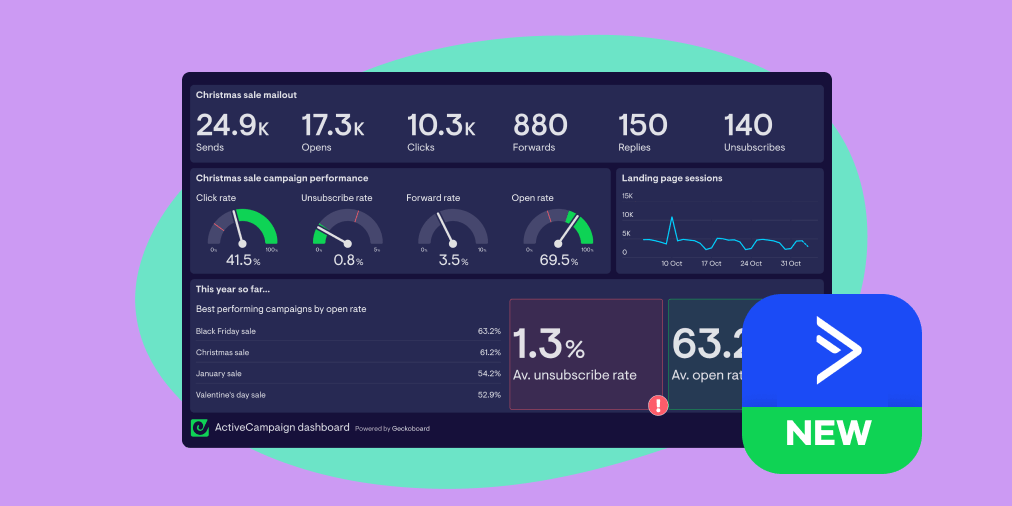
ActiveCampaign's comprehensive analytics dashboard displaying detailed campaign performance metrics including 24.9k sends, 17.3k opens, and advanced performance tracking capabilities.
ActiveCampaign: 10 Pros & Cons Analysis
The 10 Key Advantages
1. Sophisticated Automation Workflows Without Enterprise Complexity
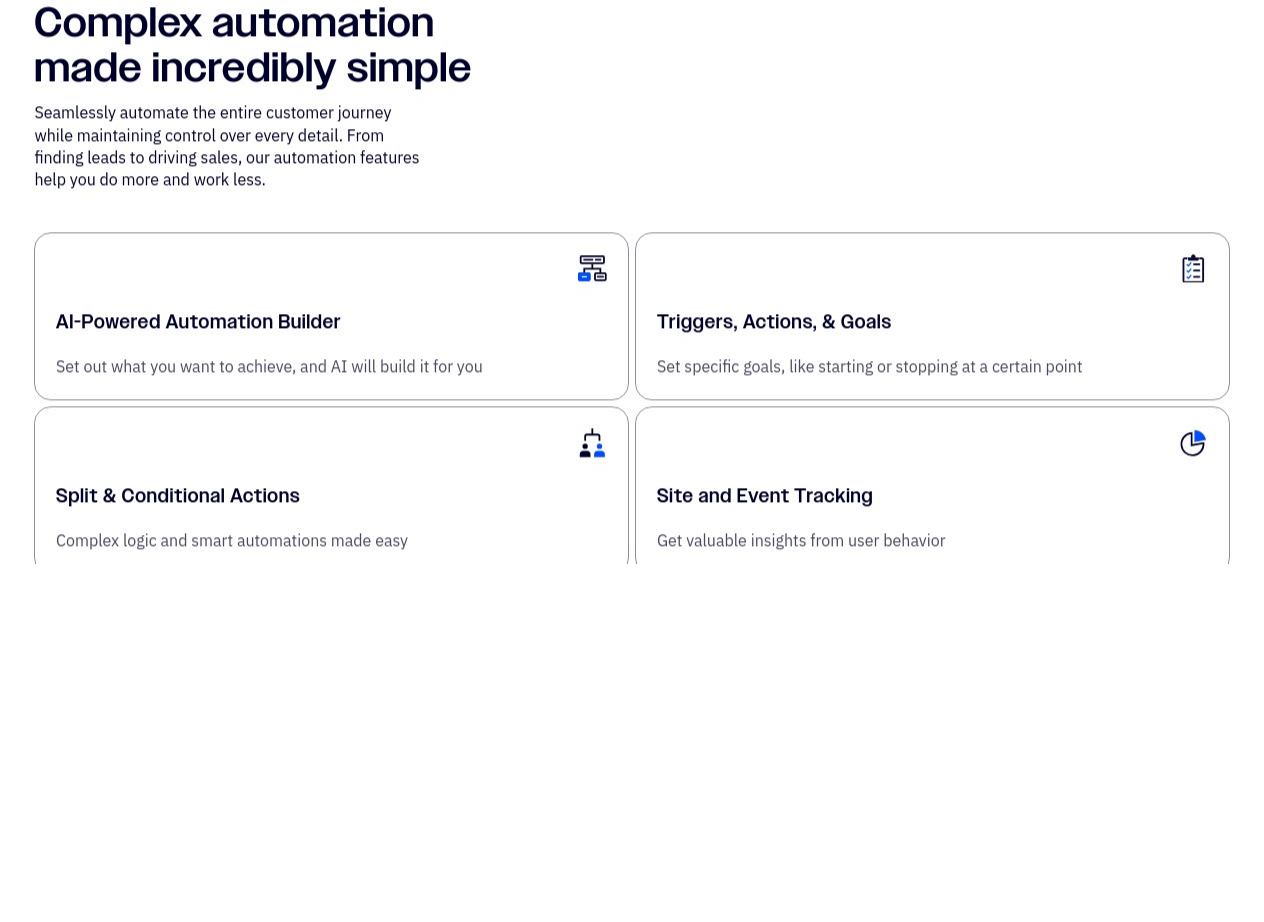
ActiveCampaign's greatest strength lies in its ability to provide enterprise-level automation capabilities through an intuitive visual interface. The platform enables creation of complex customer journeys with multiple triggers, conditional logic, and branching paths that would typically require expensive enterprise software or technical expertise. Our testing revealed that businesses can create automation workflows comparable to those found in platforms costing 5-10 times more, making advanced marketing automation accessible to growing companies.
The visual workflow builder uses a drag-and-drop interface that makes complex automation logic understandable and manageable. Users can create sophisticated if-then scenarios, combine multiple triggers, and design branching customer journeys without requiring coding skills or extensive technical training. This accessibility democratizes advanced marketing automation for businesses that previously couldn't afford or manage enterprise-level solutions.
2. Integrated CRM Eliminates Need for Separate Tools
ActiveCampaign's built-in CRM functionality provides significant value by eliminating the need for separate customer relationship management tools. The integrated CRM includes lead scoring, deal tracking, sales pipeline management, and contact management capabilities that seamlessly connect with marketing automation workflows. This integration creates a unified view of customer interactions from initial contact through sale and beyond.
The CRM integration enables automatic lead qualification based on behavior and engagement, reducing manual sales efforts and improving lead quality. Sales teams can access complete interaction histories, including email engagement, website behavior, and automation participation, providing context that improves sales conversations and conversion rates. This unified approach eliminates data silos and ensures consistent customer experiences across marketing and sales touchpoints.
3. Advanced Segmentation Based on Behavior and Engagement
ActiveCampaign's segmentation capabilities go far beyond traditional demographic targeting to include sophisticated behavioral segmentation based on customer actions, engagement patterns, and interaction history. The platform enables creation of dynamic segments that automatically update based on changing customer behavior, ensuring that messaging remains relevant and targeted as customers evolve through their journey.
The segmentation engine supports complex criteria combinations using AND/OR logic, enabling highly specific audience targeting based on multiple factors simultaneously. Users can create segments based on email engagement metrics, website behavior, purchase history, automation participation, and custom field values. This granular targeting capability enables more personalized messaging and higher conversion rates compared to broad demographic-based approaches.
4. Comprehensive Multichannel Campaign Capabilities
ActiveCampaign's multichannel approach enables businesses to create cohesive customer experiences across email, SMS, WhatsApp, and social media channels. The platform's unified customer profiles track interactions across all channels, providing a comprehensive view of each customer's engagement history and enabling more informed decisions about channel selection and message timing.
The multichannel capabilities include seamless transitions between communication channels within automation workflows, enabling businesses to reach customers through their preferred communication methods. This flexibility improves engagement rates and customer satisfaction by meeting customers where they are most comfortable communicating.
5. Extensive Integration Ecosystem with 950+ Apps
ActiveCampaign's integration ecosystem includes over 950 applications, providing exceptional flexibility for businesses using diverse tool stacks. The extensive integration options enable seamless data flow between ActiveCampaign and other business systems, reducing manual data entry and ensuring consistent customer information across all platforms.
Key integrations include popular e-commerce platforms, CRM systems, analytics tools, social media platforms, and business productivity applications. These integrations enable automated data synchronization and trigger-based actions that extend ActiveCampaign's automation capabilities across the entire business technology stack.
6. Predictive Analytics and AI-Powered Optimization
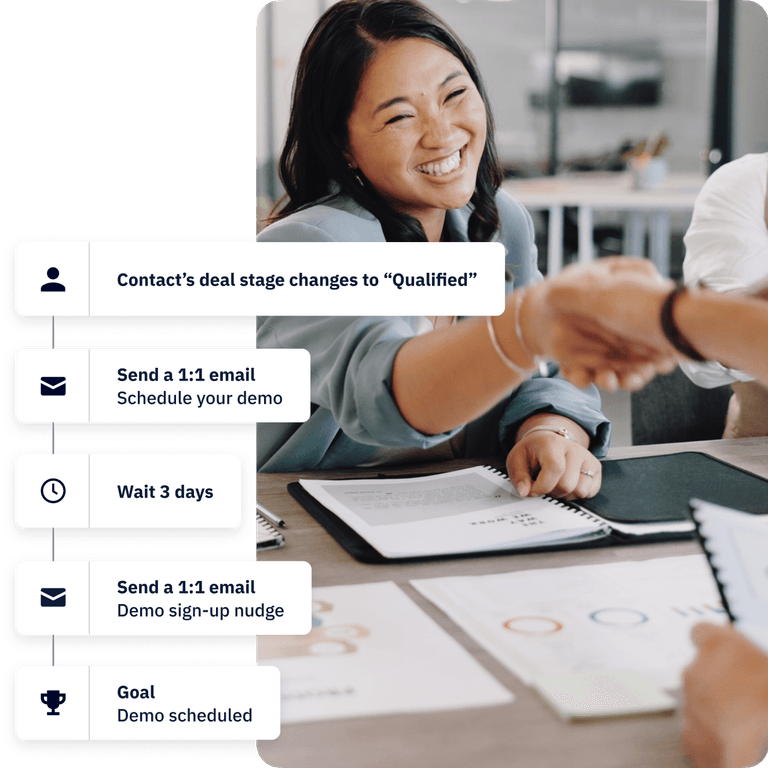
ActiveCampaign's AI-powered features include predictive sending optimization, content recommendations, and performance insights that help optimize campaign effectiveness without requiring manual analysis. The platform's "Active Intelligence" uses machine learning to identify the best times to send emails to individual contacts, suggest content improvements, and predict customer behavior patterns.
These AI capabilities reduce the manual effort required to maintain effective marketing campaigns while improving overall performance. The predictive analytics help identify opportunities and risks before they become apparent through traditional metrics, enabling proactive customer engagement strategies.
7. Unlimited Email Sending Across All Plans
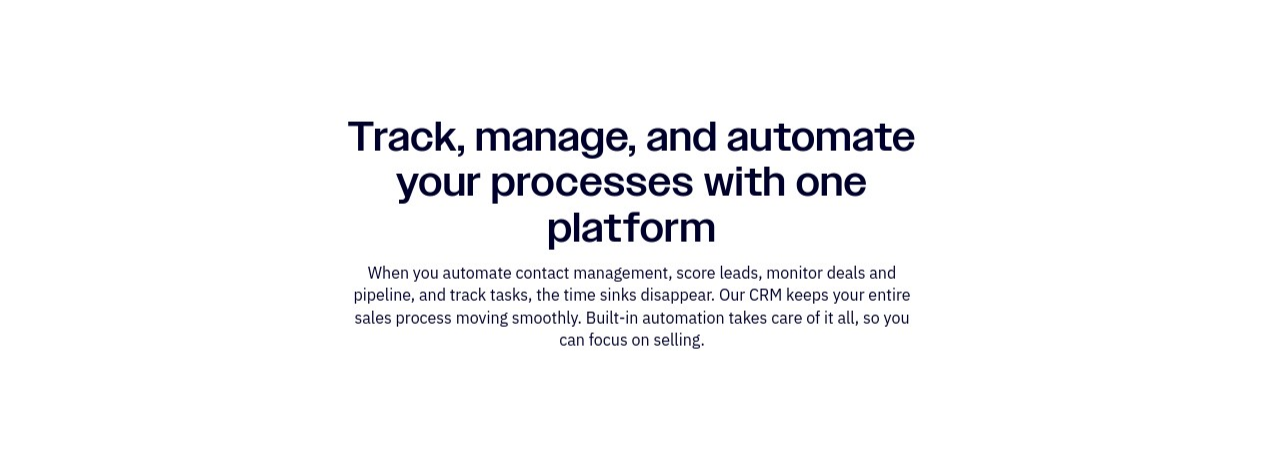
Unlike many competitors that charge based on email volume, ActiveCampaign includes unlimited email sending across all pricing tiers. This unlimited sending provides cost predictability and encourages more frequent customer communication, which can improve engagement and customer relationships without increasing costs.
The unlimited sending model is particularly valuable for businesses with active email marketing programs or those using frequent touchpoint strategies. This pricing approach eliminates concerns about email volume limits and enables businesses to focus on engagement quality rather than quantity restrictions.
8. Robust A/B Testing and Optimization Tools
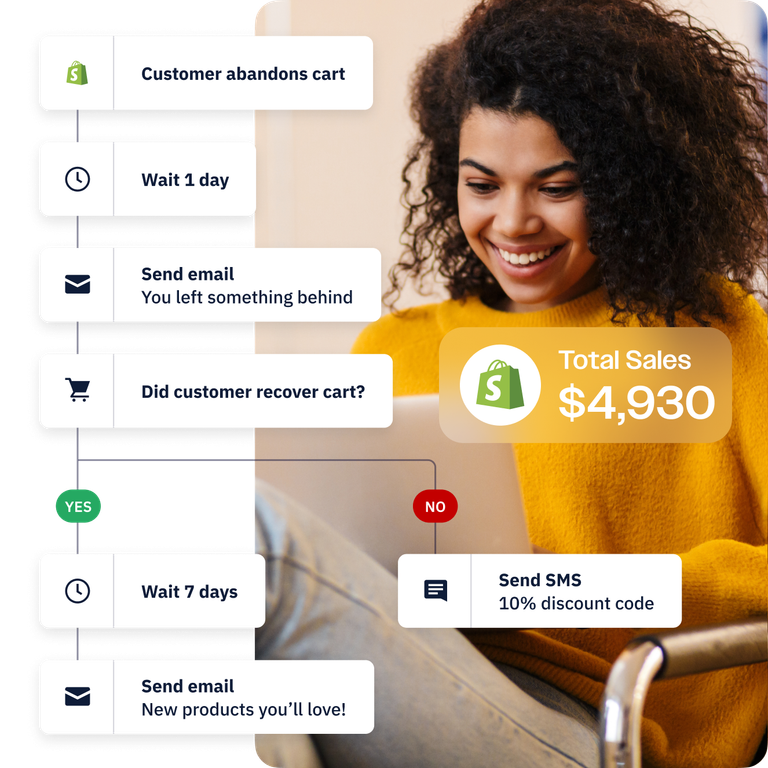
ActiveCampaign provides comprehensive A/B testing capabilities that extend beyond simple subject line testing to include content variations, send time optimization, and entire automation workflow testing. The platform includes statistical significance calculations and automatic winner selection, ensuring that test results are reliable and actionable.
The ability to test complete automation workflows, not just individual emails, enables optimization of complex customer journeys and helps identify the most effective paths for achieving specific business goals. This sophisticated testing approach provides insights that wouldn't be available through traditional email testing alone.
9. Strong Deliverability Tools and Reputation Management
ActiveCampaign includes advanced deliverability tools that help ensure emails reach recipient inboxes rather than spam folders. The platform provides feedback loop data, list cleaning integrations, authentication setup assistance, and deliverability monitoring that helps maintain strong sender reputation and high inbox placement rates.
The deliverability tools include proactive monitoring and alerts that help identify potential issues before they impact campaign performance. This focus on deliverability provides significant value for businesses that depend on email marketing for revenue generation and customer communication.
10. Comprehensive Onboarding and Educational Resources
ActiveCampaign provides extensive onboarding support, educational resources, and customer enablement programs that help businesses maximize platform value. The onboarding process includes personalized setup assistance, strategy consultation, and training resources that reduce time to value and improve adoption rates.
The educational resources include video tutorials, best practice guides, certification programs, and regular webinars that help users stay current with platform capabilities and marketing automation best practices. This educational focus helps businesses continuously improve their marketing automation effectiveness over time.
The 10 Key Limitations
1. Higher Pricing Compared to Basic Email Marketing Tools
ActiveCampaign's pricing is significantly higher than basic email marketing platforms like Mailchimp's free tier or Constant Contact's entry-level plans. While the additional functionality justifies the higher cost for businesses requiring advanced features, the pricing can be prohibitive for small businesses with simple email marketing needs or tight budgets.
The contact-based pricing model can become expensive for businesses with large contact lists, particularly those in early growth stages with limited revenue per contact. Businesses with over 10,000 contacts should carefully evaluate the total cost of ownership and ensure that the advanced features provide sufficient value to justify the investment.
2. Steep Learning Curve for Advanced Features
While ActiveCampaign's basic features are relatively easy to use, mastering the platform's advanced automation and segmentation capabilities requires significant time investment and learning. The sophisticated feature set can be overwhelming for users without prior marketing automation experience, potentially leading to underutilization of the platform's capabilities.
New users often struggle with the complexity of creating advanced automation workflows and may require training or consulting assistance to fully leverage the platform's potential. This learning curve can delay time to value and may require additional resource investment for training and implementation.
3. Limited Email Template Design Flexibility
ActiveCampaign's email editor, while functional, lacks the design flexibility and template variety offered by specialized email design platforms. The drag-and-drop editor provides basic customization options but may not satisfy businesses requiring highly customized or visually complex email designs.
The template library, while adequate, doesn't offer the extensive variety or industry-specific options available from competitors focused primarily on email design. Businesses with strong brand requirements or complex design needs may find the email creation tools limiting compared to design-focused alternatives.
4. SMS and WhatsApp Messaging Costs Can Add Up
While ActiveCampaign includes SMS and WhatsApp messaging capabilities, these features require additional per-message charges that can significantly increase total costs for businesses using these channels frequently. The messaging costs vary by country and carrier, making it difficult to predict total expenses for multichannel campaigns.
The additional messaging costs can make ActiveCampaign's multichannel approach expensive compared to specialized SMS marketing platforms or businesses using high-volume text messaging strategies. Careful cost analysis is required to ensure that multichannel campaigns provide sufficient ROI to justify the additional expenses.
5. CRM Functionality Limited Compared to Dedicated Solutions
While ActiveCampaign's integrated CRM provides valuable functionality, it lacks the comprehensive features and customization options available from dedicated CRM platforms like Salesforce or HubSpot CRM. The CRM capabilities are sufficient for basic sales pipeline management but may not satisfy businesses with complex sales processes or advanced CRM requirements.
The CRM limitations become apparent for businesses with multiple sales teams, complex deal structures, or extensive customization needs. Organizations requiring advanced CRM functionality may need to integrate with dedicated CRM solutions, reducing the value of ActiveCampaign's integrated approach.
6. Reporting and Analytics Could Be More Comprehensive
ActiveCampaign's reporting capabilities, while adequate, lack the depth and customization options available from specialized analytics platforms or enterprise marketing automation solutions. The standard reports provide essential metrics but may not satisfy businesses requiring detailed attribution analysis or custom reporting formats.
Advanced analytics features like multi-touch attribution, detailed customer journey analysis, and custom dashboard creation are limited compared to dedicated analytics platforms. Businesses with sophisticated reporting requirements may need additional tools to supplement ActiveCampaign's native analytics capabilities.
7. Social Media Management Features Are Basic
ActiveCampaign's social media integration and management features are relatively basic compared to dedicated social media management platforms. While the platform can automate social media posting and track basic engagement metrics, it lacks the comprehensive social media management capabilities required for businesses with active social media strategies.
The social media features work best as part of broader multichannel campaigns rather than as standalone social media management solutions. Businesses requiring advanced social media management, content scheduling, or detailed social analytics will likely need additional specialized tools.
8. Limited Customization for Enterprise Requirements
While ActiveCampaign offers an Enterprise plan, the platform's customization options may not satisfy large organizations with complex requirements or extensive customization needs. The platform lacks some enterprise features like advanced user permission management, custom object creation, and extensive API customization options.
Enterprise organizations may find ActiveCampaign's standardized approach limiting compared to platforms designed specifically for large organizations with complex operational requirements. The platform works best for small to medium-sized businesses rather than large enterprises with extensive customization needs.
9. Customer Support Response Times Can Vary
While ActiveCampaign provides multiple support channels including email, chat, and phone support, response times can vary significantly based on plan level and issue complexity. Lower-tier plans may experience longer response times, and complex technical issues may require multiple interactions to resolve.
The support quality is generally good, but businesses requiring immediate response times or dedicated support resources may find the standard support options insufficient. Enterprise customers receive priority support, but smaller businesses may experience delays during peak periods or for complex issues.
10. Platform Performance Can Slow with Complex Automations
ActiveCampaign's performance can degrade when running multiple complex automation workflows simultaneously, particularly for accounts with large contact databases and sophisticated segmentation criteria. The platform may experience slower loading times and delayed automation execution during peak usage periods.
Businesses with very large contact lists or extremely complex automation requirements may experience performance limitations that impact campaign execution timing and user experience. While these performance issues are not common, they can be problematic for businesses requiring precise timing or real-time automation execution.
Implementation and Getting Started
Initial Setup and Onboarding Process
ActiveCampaign's onboarding process is designed to help businesses quickly establish effective marketing automation workflows while building foundational knowledge of the platform's capabilities. The setup process begins with account creation and contact import, followed by guided configuration of essential features including automation workflows, segmentation criteria, and integration setup.
The platform provides a structured onboarding checklist that guides new users through essential setup tasks including domain authentication, contact list import, automation creation, and integration configuration. This systematic approach helps ensure that critical setup steps aren't overlooked and provides a clear path to initial value realization.
ActiveCampaign offers personalized onboarding assistance for all paid plans, including one-on-one coaching sessions that help businesses develop effective automation strategies aligned with their specific goals and customer journey requirements. These coaching sessions provide significant value by helping businesses avoid common implementation mistakes and accelerate time to value.
Best Practices for Successful Implementation
Successful ActiveCampaign implementation requires careful planning of customer journey mapping, segmentation strategy, and automation workflow design. Businesses should begin by clearly defining their customer lifecycle stages and identifying key touchpoints where automation can provide value. This strategic foundation ensures that automation efforts align with business objectives and customer needs.
Contact segmentation strategy should be established early in the implementation process, with clear criteria for behavioral segmentation, lifecycle stage classification, and engagement scoring. ActiveCampaign's advanced segmentation capabilities are most effective when businesses have well-defined customer personas and clear understanding of customer behavior patterns.
Automation workflow design should start with simple, high-impact sequences before progressing to more complex customer journeys. Beginning with basic welcome sequences, abandoned cart recovery, or lead nurturing workflows allows businesses to gain experience with the platform while delivering immediate value. More sophisticated automation can be added gradually as teams become comfortable with the platform's capabilities.
Integration planning is crucial for maximizing ActiveCampaign's value, particularly for businesses using multiple business systems. Priority should be given to integrations that enable automatic data synchronization and reduce manual data entry. E-commerce platforms, CRM systems, and analytics tools typically provide the highest value integrations for most businesses.
Training and Skill Development Requirements
ActiveCampaign's advanced capabilities require ongoing training and skill development to maximize platform value. The platform provides comprehensive educational resources including video tutorials, certification programs, and best practice guides that help users continuously improve their marketing automation effectiveness.
Team training should focus on both technical platform skills and strategic marketing automation concepts. Technical training covers automation workflow creation, segmentation setup, and campaign optimization, while strategic training addresses customer journey mapping, automation strategy development, and performance analysis.
ActiveCampaign's certification programs provide structured learning paths for different user roles including marketers, sales professionals, and administrators. These certifications help ensure that team members have the knowledge needed to effectively use the platform's advanced features and implement best practices.
Regular training updates are important as ActiveCampaign continuously adds new features and capabilities. The platform's frequent feature releases require ongoing education to ensure that businesses can take advantage of new functionality and maintain optimal platform utilization.
Integration Strategy and Technical Considerations
ActiveCampaign's extensive integration ecosystem requires careful planning to ensure optimal data flow and automation effectiveness. Integration strategy should prioritize connections that enable automatic data synchronization and reduce manual processes while supporting key business workflows.
E-commerce integrations typically provide the highest value for retail businesses, enabling automatic customer data synchronization, purchase behavior tracking, and automated marketing responses to customer actions. Popular e-commerce platforms including Shopify, WooCommerce, and BigCommerce offer deep integration capabilities that extend ActiveCampaign's automation potential.
CRM integrations are valuable for businesses with existing sales processes and customer data in dedicated CRM systems. While ActiveCampaign includes built-in CRM functionality, businesses with established CRM workflows may prefer to integrate with existing systems rather than migrate to ActiveCampaign's CRM.
Analytics and reporting integrations enable enhanced performance tracking and attribution analysis beyond ActiveCampaign's native reporting capabilities. Google Analytics, Facebook Pixel, and other tracking platforms can provide additional insights into campaign effectiveness and customer journey performance.
API integrations may be necessary for businesses with custom applications or unique data requirements. ActiveCampaign's API provides extensive functionality for custom integrations, though technical expertise may be required for implementation and maintenance.
Final Recommendations and Verdict
Who Should Choose ActiveCampaign
ActiveCampaign is ideally suited for small to medium-sized businesses that have outgrown basic email marketing tools and need sophisticated automation capabilities without enterprise-level complexity and costs. The platform particularly excels for businesses requiring advanced customer journey management, behavioral segmentation, and integrated CRM functionality.
E-commerce businesses represent an ideal target market for ActiveCampaign, as the platform's automation capabilities can significantly improve customer lifecycle management, abandoned cart recovery, and post-purchase engagement. The ability to create sophisticated automation workflows based on purchase behavior and customer lifecycle stages provides substantial value for online retailers.
Service-based businesses with complex customer journeys also benefit significantly from ActiveCampaign's capabilities. Professional services, consulting firms, and B2B companies can use the platform's automation and CRM features to nurture leads through long sales cycles while maintaining consistent customer communication.
Growing businesses in transition from simple email marketing to comprehensive marketing automation will find ActiveCampaign's scalable approach particularly valuable. The platform's ability to start with basic functionality and gradually add sophistication makes it an excellent choice for businesses planning significant growth.
Who Should Consider Alternatives
Businesses with simple email marketing needs and limited budgets may find ActiveCampaign's pricing and complexity unnecessary. Organizations primarily focused on basic newsletter sending or simple promotional campaigns might be better served by less expensive, simpler alternatives like Mailchimp's basic plans or Constant Contact.
Large enterprises with complex customization requirements and extensive integration needs may find ActiveCampaign's standardized approach limiting. Organizations requiring advanced user permission management, custom object creation, or extensive API customization might be better served by enterprise-focused platforms like Salesforce Marketing Cloud or Adobe Campaign.
Businesses requiring specialized functionality for specific industries may benefit from industry-focused alternatives. For example, pure e-commerce businesses might prefer Klaviyo's specialized e-commerce features, while content creators might find ConvertKit's creator-focused approach more suitable.
Organizations with very large contact databases (over 100,000 contacts) should carefully evaluate total cost of ownership, as ActiveCampaign's contact-based pricing can become expensive at scale. High-volume senders might find better value with platforms offering volume-based pricing or enterprise solutions with flat-rate pricing models.
Strategic Implementation Recommendations
Businesses choosing ActiveCampaign should approach implementation strategically, beginning with clear goal definition and customer journey mapping before diving into automation creation. The platform's sophisticated capabilities are most effective when aligned with well-defined business objectives and customer experience strategies.
Start with simple, high-impact automation workflows that provide immediate value while building team familiarity with the platform. Welcome sequences, lead nurturing campaigns, and basic segmentation provide good starting points that deliver quick wins while establishing foundational automation practices.
Invest in proper training and onboarding to maximize platform value. ActiveCampaign's advanced features require knowledge and skill development to use effectively. Taking advantage of the platform's educational resources and onboarding assistance can significantly improve implementation success and time to value.
Plan for gradual sophistication increases rather than attempting to implement complex automation immediately. ActiveCampaign's capabilities can support very sophisticated marketing automation, but businesses typically achieve better results by building complexity gradually as teams develop expertise and confidence with the platform.
Long-term Value and Growth Potential
ActiveCampaign's scalable architecture and continuous feature development make it an excellent long-term platform choice for growing businesses. The platform's ability to support increasing sophistication and complexity means that businesses can continue using ActiveCampaign as they grow without needing to migrate to different solutions.
The platform's focus on automation innovation and AI-powered features positions it well for future marketing automation trends. ActiveCampaign's investment in "autonomous marketing" capabilities suggests continued development of features that reduce manual effort while improving campaign effectiveness.
ActiveCampaign's extensive integration ecosystem and API capabilities provide flexibility for businesses with evolving technology needs. The platform's ability to connect with diverse business systems ensures that it can adapt to changing business requirements and technology stacks.
The platform's pricing model scales predictably with business growth, providing cost transparency for budgeting and planning purposes. While costs increase with contact list growth, the unlimited email sending and feature access provide good value for businesses with active marketing programs.
Conclusion
ActiveCampaign successfully delivers on its promise of providing enterprise-level marketing automation capabilities at mid-market pricing, making it an excellent choice for businesses seeking sophisticated customer journey management without the complexity and cost of enterprise platforms. Our comprehensive analysis reveals a platform that has evolved significantly beyond its email marketing origins to become a comprehensive customer experience automation solution.
The platform's greatest strengths lie in its sophisticated automation workflow capabilities, integrated CRM functionality, and advanced segmentation options that enable highly personalized customer experiences. These capabilities, combined with an extensive integration ecosystem and AI-powered optimization features, provide significant value for businesses requiring advanced marketing automation functionality.
While ActiveCampaign's pricing is higher than basic email marketing tools and the platform requires investment in training and implementation, the value provided by its advanced capabilities justifies the cost for businesses that can effectively utilize its sophisticated features. The platform's scalable approach enables businesses to start with basic functionality and gradually add sophistication as needs evolve and teams develop expertise.
ActiveCampaign represents an excellent choice for small to medium-sized businesses, e-commerce companies, and growing organizations that need more than basic email marketing but aren't ready for enterprise-level complexity and costs. The platform's combination of power, usability, and value makes it a standout option in the competitive marketing automation landscape.
For businesses evaluating marketing automation solutions, ActiveCampaign deserves serious consideration, particularly for organizations requiring sophisticated automation workflows, integrated CRM functionality, and advanced customer journey management capabilities. The platform's 14-day free trial provides an excellent opportunity to evaluate its capabilities and determine fit for specific business requirements.
Final Rating: 4.5/5 Stars
ActiveCampaign earns our strong recommendation for businesses seeking advanced marketing automation capabilities with excellent value and manageable complexity. The platform successfully delivers enterprise-level functionality at mid-market pricing, making sophisticated marketing automation accessible to a broader range of businesses than ever before.

